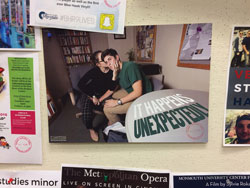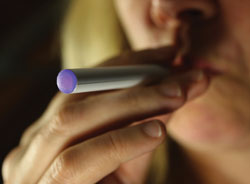Tacked and taped across University bulletin boards, locker rooms, and dormitory bathroom stalls are signs from this year’s sexual assault poster campaign titled It Happens by photographer Yana Mazurkevich. The posters have been showcased since Hawks United Week in early October by the Office of Equity and Diversity, the General Council, and Student Life.
“Each year we have tried to run a poster campaign as part of the Hawks United Week of programing, and this was the poster campaign that we chose for this year. Last year it was Tuned Into Consent which took song lyrics and made them about consent. This year we went with the It Happens poster campaign,” said Nina Anderson, Director of the Office of Equity and Diversity.
It Happens is “because sexual assault ‘happens,’” Mazurkevich told A Plus in an email. “It happens to anyone, regardless of skin color or sexual orientation.”
The explicit nature of Mazurkevich’s posters are intentional; she wanted the photos to make people uncomfortable — as uncomfortable as talking about rape and sexual assault is. “Sexual assault is not pretty,” she said. “No one is going to put a pillow below your head and then rape you… The images are not supposed to be easy to look at, just like the subject itself is not supposed to be easy to talk about.”
The campaign was discovered on social media by Mary Anne Nagy, Vice President for Student Life and Leadership Engagement. She said, “Believe it or not I actually saw the campaign posted up on Facebook. It was around the time that you were hearing a lot of coverage in the media about the situation with Brock Turner. When I saw the campaign on Facebook I was struck by it.”
“I immediately recognized that the pictures were clearly edgy, but I was struck by the simplicity of the message; there were very few words, and it was all about the picture. I was also struck by the fact that the survivor in each picture was staring directly at the camera, and I was struck by how powerful they were,” she added.
Afterwards Nagy shared the link with Anderson, and the idea to display the campaign on campus quickly transposed. They obtained permission from the photographer, and received approval from John Christopher, the Vice President and General Counsel, and members of the President’s Cabinet. According to Anderson the campaign will stay up throughout the entire academic year.
The poster series was inspired by the Brock Turner rape case. In March, Turner was found guilty of raping an unconscious woman behind a garbage bin at Stanford University. According to Vice News the case fueled a wide debate in the U.S. about rape culture, campus sexual assault, privilege in the criminal justice system, and campus safety.
Mazurkevich revealed the series the same day that Brock Turner was released 3 months ahead of his original 6 months’ probation time in September.
“I think the posters are very thought provoking especially on a campus like Monmouth, where rape isn’t really publicized or talked about,” said Moon Kim, a junior business student.
“The posters are not inappropriate, they are the truth. It’s life, and it happens. Sexual assault is a real thing, and sweeping it under the rug like it is nothing is not going to solve the problem. That is why this campaign is good, because it forces people to think about it,” Kim added.
“It’s about what resonates with the students,” said Nagy. “If the campaign resonates with our students and it causes them to have conversations, and to ponder then that’s what is important. The more we make people aware of the issue, and get people to talk about it particularly our students, I am hopeful that we will begin to change the culture.”
Although the posters might draw students’ attention, Corey Wrenn, Director of Gender Studies Department and a lecturer of sociology, asserts that the University could be even more proactive in the fight against sexual assault. She said, “Vague posters do not make up for institutional support. The university is in the best position to make a real and lasting impact on the epidemic. Taking rape reports seriously, holding rapists accountable, taking meaningful proactive behavior, and working with students and faculty to create impactful and high-value programming is the strongest move forward.”
Wrenn also ascertained that research should be done to learn if the posters are truly impactful. “So often these types of awareness campaigns go out based on ‘common sense,’ status quo, traditional approaches to the problem, but fail to do the research to ascertain if they actually work,” she said.
“My concern is that the posters that I have seen on campus rely heavily on shocking imagery without the requisite information on what power imbalances or predatory behavior caused the situation, or what bystanders or the targeted can do. We also live in a porn culture, heavily saturated with these very same images in a sexualized context; how do we know if they are even registering?” Wrenn added.
As many as one in four women experience sexual assault at college, though the vast majority never report it, according to a study of students at nine schools released in January by the Bureau of Justice Statistics.
Monmouth University is not immune to campus sexual assault. Since the start of the academic year, there has been 2 reported cases, according to Anderson.
If you or someone you know is a victim of sexual assault and wants to seek assistance there are a number of resources both confidential and non-confidential at the University. Confidential resources include the health center, psychological services, and the offices of Anderson and Nagy. Residential Life and Residential Assistants are available as well. Reports can be made with the Monmouth University Police Department. Off campus there is the organization 180 Turning Lives Around.
IMAGE TAKEN by Jamilah McMillan




